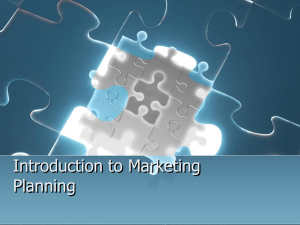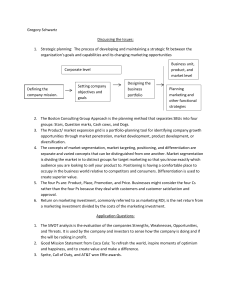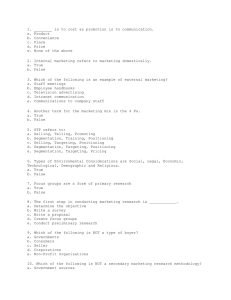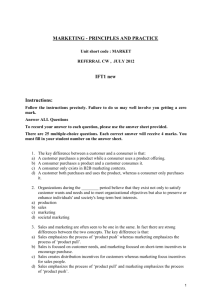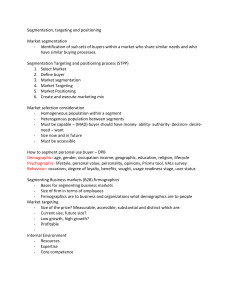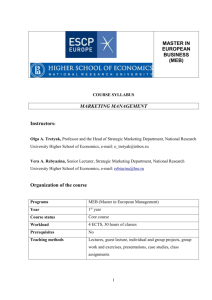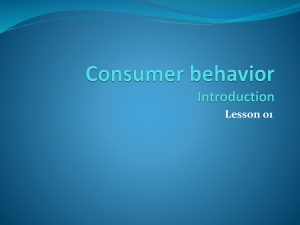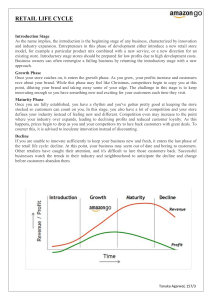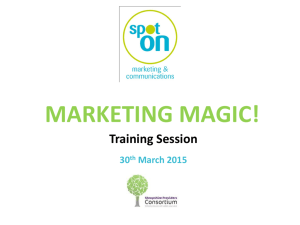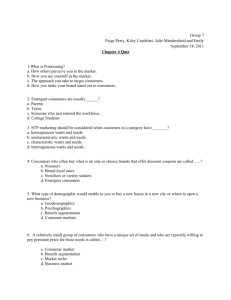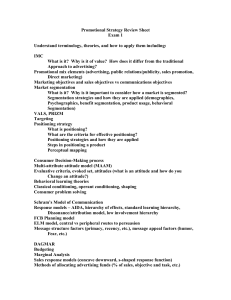The marketing budget
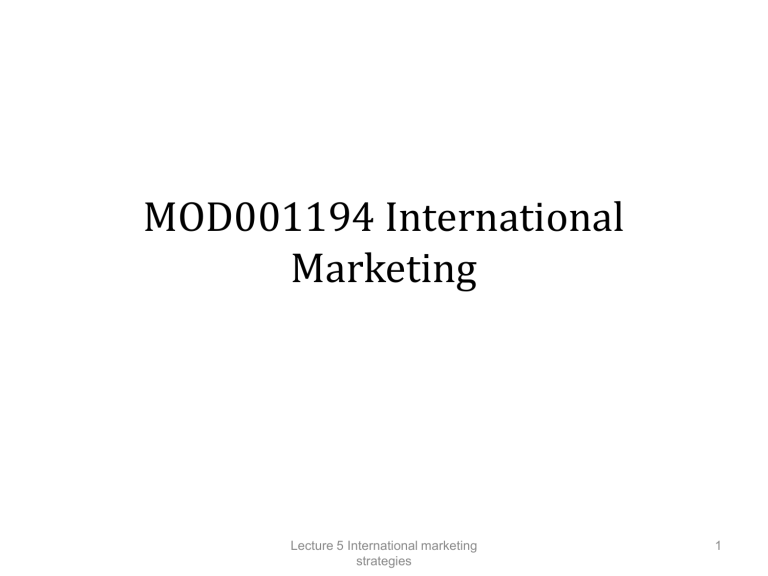
MOD001194 International
Marketing
Lecture 5 International marketing strategies
1
Lecture 5: International Marketing strategies
• Competition in the global marketplace
• International Marketing strategy
• STP
• PLC
• The International Marketing Planning Process
• Problems with planning for multinational firms
Lecture 5 International marketing strategies
2
Formulating International Marketing Strategy
• Generic strategy:
• Differentiation strategy
• Focus strategy
• Cost leadership…………..All three?
Sustainable competitive advantage (SCA)
Lecture 5 International marketing strategies
3
Factors influencing international marketing strategy
Lecture 5 International marketing strategies
4
Segmentation, Targeting & Positioning
• Segmentation: Dividing the market into subgroups of consumers that share similar characteristics
• Targeting: Selecting a target segment
• Positioning: creating an image of your product and its quality in the customers’ minds
Lecture 5 International marketing strategies
5
Same company…..different message?
Lecture 5 International marketing strategies
6
STP for Saga Insurance
• Segmentation: demographics, particularly age
• Targeting: Over 50’s.
• Positioning: Aimed largely at those that are retired with high disposable income.
Lecture 5 International marketing strategies
7
Lecture 5 International marketing strategies
8
The International Planning Process
Phase 1
Preliminary analysis and screening: matching company/country needs
Phase 2
Adapting the marketing mix to target markets
Phase 3
Developing the marketing plan
Phase 4
Implementation and control
Lecture 5 International marketing strategies
•
Situation analysis
•
Objectives and goals
•
Strategy and tactics
•
Budgets
•
Action programmes
9
Stages associated with International
Marketing planning
• 1) Formulation of goals/objectives
• 2) External environmental analysis
• 3) Internal environmental analysis
• 4) Generalisation of global marketing strategies
• 5) Marketing strategies selection
• 6) Implementation & Control
• Source: Chae and Hill (1999) “Determinants and benefits of global strategic marketing planning formality”, International Marketing Review, 17, 6 pp.538-562
Lecture 5 International marketing strategies
10
Situational analysis
• requires a thorough study of the broad trends within the economy and society, as well as a detailed analysis of consumer, markets, competitors, in fact all key stakeholders’
• Internal and external audit.
• Examines current environmental conditions in the proposed market of entry (PESTLE factors)
• Various models can be used for this stage e.g.
SWOT, Marketing Mix, stakeholder analysis, and competitor analysis.
Lecture 5 International marketing strategies
11
International marketing objectives
• Must be SMART related
• Ideally short/medium/long-term
• Must be inline with corporate objectives
• Examples of international marketing objectives – market share related, brand awareness, increase sales
Lecture 5 International marketing strategies
12
International Marketing Objectives
Must be SMART related
Ideally short/medium/long-term
Must be inline with corporate objectives e.g. ‘Ford’
Our vision : to become the world's leading company for automotive products and services.
Our mission : we are a globally diverse family, with a proud heritage, that’s passionately committed to providing outstanding products and services.
Our values : we do the right thing for our people, our environment and our society, but above all for our customers.
Examples of international marketing objectives – market share related, brand awareness, increase sales
Lecture 5 International marketing strategies
13
Marketing strategy
• ‘Strategies used in order to achieve international marketing objectives’
• Consider growth strategies (Ansoff), market entry methods, Porter’s generic strategies, STP (segmentation, targeting and positioning, standardisation, adaptation
Lecture 5 International marketing strategies
14
Implementation
• ‘Implementation is putting the plan into action’
• The marketing budget : ‘how much the organisation intends to spend carrying out the plan’
• Example of a typical marketing budget for a medium sized company:
£
Salaries and wages of marketing staff
Advertising expenses
PR activities
100,000
50,000
20,000
Market research
Direct Marketing costs
Selling and agency commission
TOTAL
15,000
23,000
30,000
238,000
Lecture 5 International marketing strategies
15
Control
• ‘Control is the process of ensuring that the results of operations conform to established goals’
• Control methods include: benchmarking, self assessment, investment analysis, customer analysis and retention, regular comparison of actual sales and marketing costs against budget
Lecture 5 International marketing strategies
16
Problems with planning for multinational firms
• Distance between the corporate plan and its implementation ‘on the ground’
• Degree of variation in environmental conditions
• Difference of opinion between corporate planners and local managers
• Whose responsibility is marketing planning?..........
Lecture 5 International marketing strategies
17
Next week
• Read: Ghauri and Cateora (2010) Ch.10 pp.241-262.
Lecture 5 International marketing strategies
18
